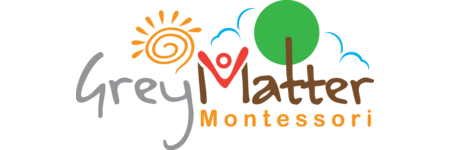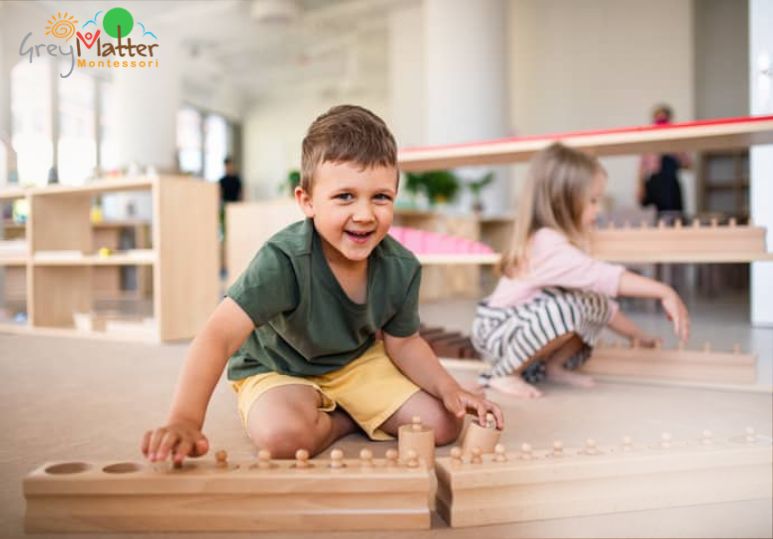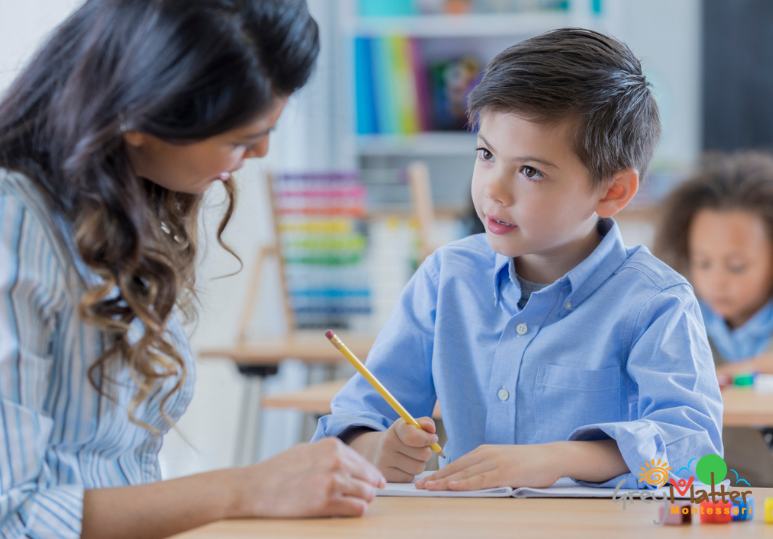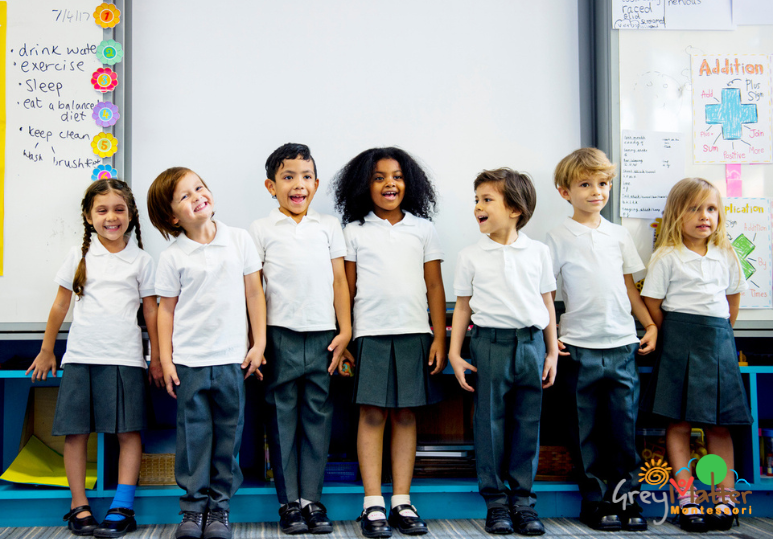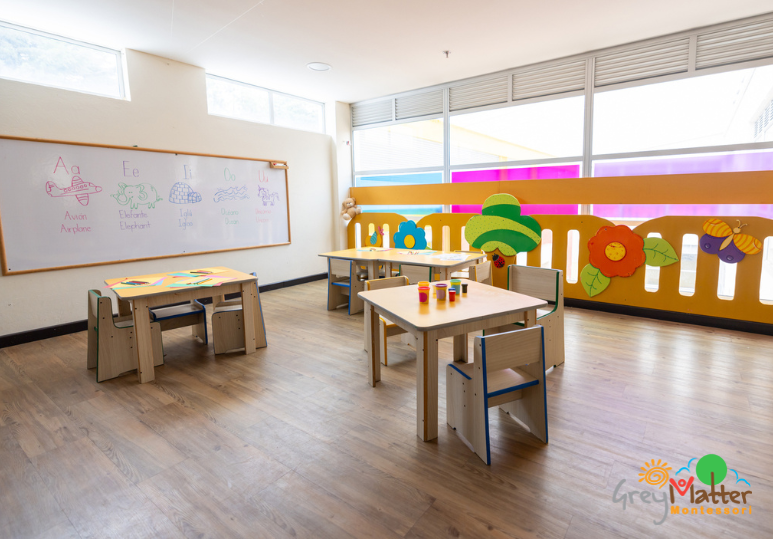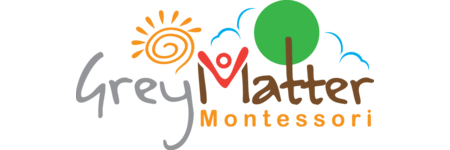The Differences Between Traditional Kindergarten And Montessori Kindergarten
Classroom Grouping
Traditional: Grouped By Age
In a traditional kindergarten classroom setting, students are grouped by age. Typically all students in standard kindergarten programming will be aged 5 and 6 and most school administrations have clearly defined guidelines based on birthdate. Curriculum and learning activities are based on the development of the average kindergarten-aged student. Many students can find success because they can progress at the expected pace, but for students that struggle to keep up, feelings of frustration or discouragement can be a challenge.
Montessori: Mixed-Age Groupings
In a Montessori classroom children are grouped by stage of development. Mixed-age classrooms are a key mandate in a Montessori school. This means a Montessori classroom environment will typically have children aged 3-6 in the same learning environment. The Montessori mixed-age class provides the opportunity for children to progress through activities at their own pace in each subject area, even if they are slower at mastering certain skills than their same-aged peers. The mixed-age classroom also provides enhanced opportunities for older, kindergarten-aged children to assume roles of leadership with younger students in the classroom community.
Curriculum
Traditional: Teacher-Led/ Group Learning
Often, in a traditional kindergarten classroom, the school day is structured and scheduled with very specific target outcomes. This is a very typical way for educators to manage a standard kindergarten classroom. The teacher will introduce a concept, then lead students through an exercise to reinforce the concept with clear expectations and measures of success. Students are expected to stay in place and complete activities within a designated time.
Montessori: Child-Led/ Independent Learning
In a Montessori classroom, students explore subject areas as they are inspired to and at their own pace. The classroom is designed to facilitate independent learning and provide opportunities for children to explore with hands-on activities, interact with other students, and move between activities as they choose. Dr. Maria Montessori believed that learning is linked to movement and that physical activity can increase focus and improve cognitive function. In a Montessori classroom, the teacher is there to guide, but not direct.
Measures Of Success
Traditional: Performance Assessments/ Standardized Curriculum
Many traditional kindergarten programs follow a standardized curriculum set out by a board and implemented in all classrooms throughout a district. This curriculum typically defines expected outcomes by the end of the school year such as reciting the alphabet and recognizing a certain number of sight words. Children are assessed throughout the school year with a concise competency-based grading system. This does not mean that students will necessarily receive an A, B, or C or a percentage grade, but students are measured against expected achievements typical for their age.
Montessori: Progression Not Performance
In a Montessori kindergarten program, the emphasis is on progress and continuous learning rather than on a grade. By removing the grading system, children are motivated by a love of learning and inspired to improve rather than simply striving for better grades. Students are encouraged to explore through hands-on activities, to make mistakes and learn from them, develop critical thinking as they strive to develop independence, and set goals for their own progress. Montessori teachers will diligently observe students to determine when they are ready to learn a new skill. This observation allows teachers to communicate with the parents and with the child when more encouragement and improvement is needed and when a skill has been mastered. Progress is reported in a narrative form rather than a metric.
Explore The Benefits Of A Montessori Kindergarten Classroom At Grey Matter
There are advantages to both traditional and Montessori kindergarten programs. But we believe that every child can benefit from the nurturing, inspired, individualized learning environment of a Montessori kindergarten classroom. Kindergarten is a foundational year and can set the tone for the experience of learning for a lifetime. The skills cultivated in a Montessori program will prepare your child to adapt well, meet and exceed learning outcomes, find their unique place in the community of any school environment, and achieve success as they thrive through every grade.
If you are interested in exploring the benefits of the mixed-age kindergarten classroom in a Montessori school and the advantages of a Grey Matter Montessori education for your preschool-aged or kindergarten-aged child, contact us to book a time for a school tour at our NW Calgary location. We are accessible just off of Symons Valley Parkway in the NW community of Evanston. Call us for more info on our Calgary Montessori preschool programming at 587-707-4739.
FAQ
Q: Does Grey Matter Montessori follow the Alberta kindergarten curriculum?
A: Our curriculum is based on the principles of a Montessori education and our kindergarten program meets and exceeds all kindergarten learning outcomes as set out by the government of Alberta.
Q: Is it better for my child to stay in a Montessori program for their entire school journey?
A: We may be biased, but we believe every child can benefit from a Montessori education. However, the reality is that Montessori education is not widely available for every student from preschool to grade 12 in Calgary. And factors such as location, community, finances, and availability will influence every family’s decision about where to send their children to school. But even if a Montessori preschool and kindergarten program is the only exposure to the Montessori Method of child-led learning your child will have, the impact of this philosophy of education will set the groundwork for future academic and social success.
Q: When do you accept registration?
A: Grey Matter Montessori has ongoing registration and even offers advanced registrations (up to two years). Contact our office for more information on the upcoming school year and register as early as possible to ensure availability for your desired days and times.
